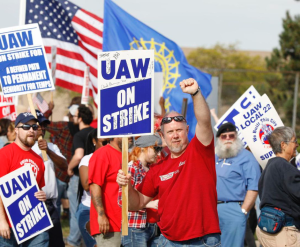 The workers have paid a heavy price for their employer’s return to profitability.
The workers have paid a heavy price for their employer’s return to profitability.
Fifty thousand workers at General Motors plants across the USA were on strike for 40 days from 15 September, demanding that the company restore the jobs, pay scales and conditions that they enjoyed before the company went bust in 2007. During that time, while the workers are estimated to have lost nearly $1m in wages, the company is estimated to have lost some $3m as a result of the strike.
The federal government came to GM’s assistance in 2009, bailing out the company to the tune of $51bn when it collapsed into bankruptcy, effectively nationalising its debt. Having got back on its feet, GM was sold off in 2013 for $39.7bn – a net loss to the taxpayer of $11.3bn (Kimberly Amadeo, ‘Auto industry bailout’, The Balance, 25 June 2019).
In the wake of the bailout, the car workers’ union, the United Auto Workers, persuaded its members to let GM recruit new permanent workers earning half the pay of workers recruited before 2007, thereby allowing management to sow division in the workforce.
In the following years, GM further diluted this already disunited work force with so-called ‘temporary’ workers, whose pay and conditions are even worse. These temps now amount to 7 percent of the workforce.
The workers have been penalised in every direction as a result of their union’s capitulation. Not only have they seen pay, conditions and job security hammered, they also have to pay the taxes that allowed the government to rescue the company in the first place, effectively paying twice over to prop up their employer.
Long after the company had returned to profitability – it made $35bn in US sales alone in the last three years – it has continued to make workers redundant and close down plants, shipping off production to Mexico. The flashpoint for the current strike, the first UAW strike since 2007, was the plan to close down the Detroit-Hamtramck plant.
The militancy of the workers has forced GM to withdraw this closure:
“The tentative contract hammered out by the United Automobile Workers and General Motors won’t please all of the union’s members, but it is sure to get strong support at the Detroit-Hamtramck assembly plant.
“The factory, which employs 700 UAW members, is scheduled to close in January. But under the contract, GM has promised to spend $3 billion to retool Hamtramck to make battery modules and electric trucks, most likely increasing its work force and ensuring its operation for at least several more years” (Neal E Boudette, ‘GM workers begin to size up the deal their union is selling’, New York Times, 18 October 2019).
When the proposed contract was put to the union members to vote upon, it passed by 57% to 43%, indicating that many workers didn’t think the settlement was an out-and-out victory, which was certainly the case for those at three plants already idled, including a factory in Lordstown, Ohio, which will all close permanently.
Better terms have been, however, offered to the workers who have retained their employment:
“The GM workers … received an $11,000 signing bonus, and the automaker agreed to essentially end its two-tier wage system by folding the lower tier into the top tier within four years. All those workers, lower-tier and top, will earn $32 an hour at contract’s end – some lower-tier workers now earning less than $20 an hour…
“The four-year GM contract calls for raises of 3% in the first and third years and a 4% lump-sum payment in the second and fourth years…” (Steve Greenhouse, ‘’Bosses take note: why GM’s strike could inspire more collective action’, The Guardian, 30 October 2019).
The company had clearly done its sums in working out how many jobs it would have to save in order to get union agreement to let the others go to the wall. In the current situation of world overproduction of cars, there was a real danger that in the absence agreement to shut three production facilities the employers are able to hold over the workers the threat that they would prefer to close down all production altogether, as the profits they were raking in were just not enough to satisfy their greed.
Comments are closed, but trackbacks and pingbacks are open.